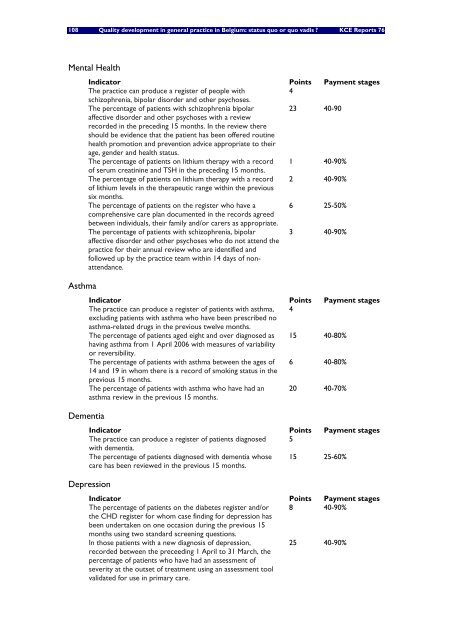status quo of quo vadis? - KCE
status quo of quo vadis? - KCE
status quo of quo vadis? - KCE
You also want an ePaper? Increase the reach of your titles
YUMPU automatically turns print PDFs into web optimized ePapers that Google loves.
108 Quality development in general practice in Belgium: <strong>status</strong> <strong>quo</strong> or <strong>quo</strong> <strong>vadis</strong> ? <strong>KCE</strong> Reports 76<br />
Mental Health<br />
Asthma<br />
Indicator Points Payment stages<br />
The practice can produce a register <strong>of</strong> people with<br />
schizophrenia, bipolar disorder and other psychoses.<br />
4<br />
The percentage <strong>of</strong> patients with schizophrenia bipolar<br />
affective disorder and other psychoses with a review<br />
recorded in the preceding 15 months. In the review there<br />
should be evidence that the patient has been <strong>of</strong>fered routine<br />
health promotion and prevention advice appropriate to their<br />
age, gender and health <strong>status</strong>.<br />
23 40-90<br />
The percentage <strong>of</strong> patients on lithium therapy with a record<br />
<strong>of</strong> serum creatinine and TSH in the preceding 15 months.<br />
1 40-90%<br />
The percentage <strong>of</strong> patients on lithium therapy with a record<br />
<strong>of</strong> lithium levels in the therapeutic range within the previous<br />
six months.<br />
2 40-90%<br />
The percentage <strong>of</strong> patients on the register who have a<br />
comprehensive care plan documented in the records agreed<br />
between individuals, their family and/or carers as appropriate.<br />
6 25-50%<br />
The percentage <strong>of</strong> patients with schizophrenia, bipolar<br />
affective disorder and other psychoses who do not attend the<br />
practice for their annual review who are identified and<br />
followed up by the practice team within 14 days <strong>of</strong> nonattendance.<br />
3 40-90%<br />
Indicator Points Payment stages<br />
The practice can produce a register <strong>of</strong> patients with asthma,<br />
excluding patients with asthma who have been prescribed no<br />
asthma-related drugs in the previous twelve months.<br />
4<br />
The percentage <strong>of</strong> patients aged eight and over diagnosed as<br />
having asthma from 1 April 2006 with measures <strong>of</strong> variability<br />
or reversibility.<br />
15 40-80%<br />
The percentage <strong>of</strong> patients with asthma between the ages <strong>of</strong><br />
14 and 19 in whom there is a record <strong>of</strong> smoking <strong>status</strong> in the<br />
previous 15 months.<br />
6 40-80%<br />
The percentage <strong>of</strong> patients with asthma who have had an<br />
asthma review in the previous 15 months.<br />
20 40-70%<br />
Dementia<br />
Indicator Points Payment stages<br />
The practice can produce a register <strong>of</strong> patients diagnosed<br />
with dementia.<br />
5<br />
The percentage <strong>of</strong> patients diagnosed with dementia whose<br />
care has been reviewed in the previous 15 months.<br />
15 25-60%<br />
Depression<br />
Indicator Points Payment stages<br />
The percentage <strong>of</strong> patients on the diabetes register and/or<br />
the CHD register for whom case finding for depression has<br />
been undertaken on one occasion during the previous 15<br />
months using two standard screening questions.<br />
8 40-90%<br />
In those patients with a new diagnosis <strong>of</strong> depression,<br />
recorded between the preceeding 1 April to 31 March, the<br />
percentage <strong>of</strong> patients who have had an assessment <strong>of</strong><br />
severity at the outset <strong>of</strong> treatment using an assessment tool<br />
validated for use in primary care.<br />
25 40-90%

















